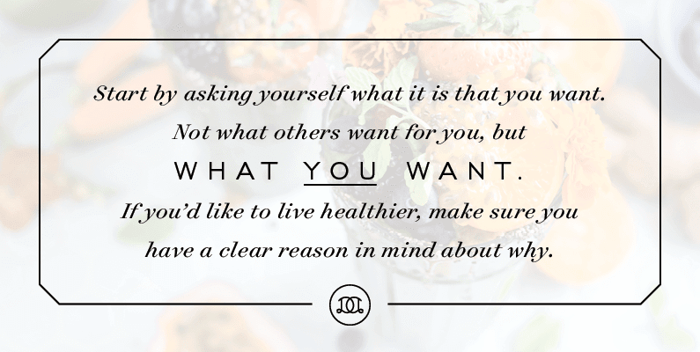At the start of a new year, most of us start setting resolutions to eat healthier, exercise more, or spend our time more productively.
Unfortunately, though, while we may have good intentions, all too often we set resolutions that we just can’t keep—and end up with dreams that we’re unable to fulfill.
The problem, oftentimes, isn’t a lack of effort. Many times, we end up failing to meet our goals because we set out with the wrong intentions. We’re doing things because we feel that we should because other people are doing them, or because we kind of like the idea of being the person that we’re trying to shape ourselves into—but the motivation is largely coming from external or superficial factors, such as seeking approval from others. Because the motivation doesn’t come from within—from something deeper, when the going gets tough, we drop out because we aren’t as passionate about the idea as we thought we were.
Instead of setting goals that are vague, or simply coasting, it’s important to be intentional. This means setting clear, purposeful goals that are intentionally chosen for a reason that’s close to your heart—something that you’re passionate about and able to commit to seeing through. Instead of deliberating endlessly over details, or trying to force yourself into a routine that just isn’t right for you, you’ll have the freedom that you need to live life intentionally, and will be able to make decisions that are best for you.
Living an intentional life is a thing of beauty—and it’s the best form of authenticity that you can find. By living intentionally, everything from how we eat, to exercise and fitness goals, to decisions on what we will buy and how we will spend our time become simpler, and less stressful.
With this in mind, let’s take a look at a few ways that you can start living intentionally and purposefully—especially when it comes to our health.
Think About What You Want
Start by asking yourself what it is that you want. Not what others want for you—but what you want. If you’d like to live healthier, make sure you have a clear reason in mind about why. Is it so you can have more energy? To feel better? To be able to do a 10k run? Start with your goal, and work down from there. If your goal is to lose 10 pounds, then you’ll want to make intentional choices that will help to set you up for success. This will spill over into your day-to-day actions, and allow you to make decisions that will help you to reach your goals. Everything about the type of food that you keep in the house, to your exercise routine will affect your end result—so keep your goals in mind, and let it guide your decisions throughout the day.
Make a Plan
Goals aren’t achieved without effort. To set yourself up for success and to get yourself off in the right direction, you’ll want to make a plan that outlines exactly how you intend to reach your goals. For instance, if your goal is to eat healthy five days out of the week, you’ll want to break it up into do-able action items. Consider making a menu and planning out your meals to ensure that you’ll have healthy food on hand and won’t be tempted to reach for junk food. Having a plan will help to keep you on track and heading toward your goals. Writing down your plans will lead to more success. Spelling it out on paper can help you to work through your thoughts, and will give you a clear, visual reminder about what you’re hoping to achieve—something that can help tremendously with it comes to intentional living.
Stick It Out
Like anything, new habits take time to cultivate, but soon they’ll become easier and eventually they become routine. Keeping your goals in mind can help to keep you on course, allowing you to make decisions deliberately and intentionally. You’ll be clearer on your direction, and less conflicted and stressed when it comes to everyday decisions. Having overarching goals in mind will give you clarity and purpose, and help to reduce stress as you’ll be able to stay the course, heading in the right direction.
* * *
As with anything in life, the things that are worth achieving often require a significant amount of work and effort. It can be tough at first, but the rewards of intentional living make it all worth it. Not only will you have a renewed sense of purpose and direction, you’ll also find it easier to stick with your goals—and will be far more likely to reach them.
How do you live intentionally when it comes to your health, or how will you start? Let us know in the comments below!
